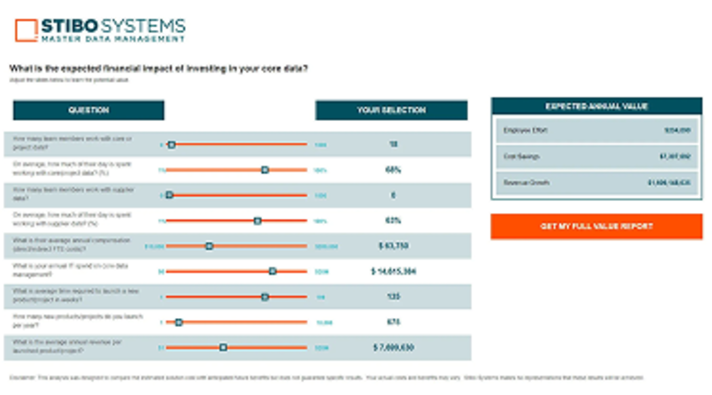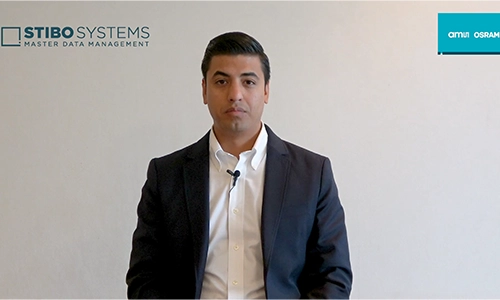STIBO SYSTEMS
Unify and govern data with master data management
Maximize the value of your data with master data management solutions, built on a proven, open platform.

Rotate your device to landscape for a better viewing experience
Fully integrated data management software solutions
A complete range of master data management solutions that empower organizations to address their unique business challenges.






Accelerate data agility with cloud-native master data management
Cloud-native SaaS is the easy choice for 90% of new customers, with many more selecting private cloud. Benefits include:
Better value
Affordable all-inclusive pricing makes SaaS master data management possible for more companies than ever before, so they can reap the benefits of a fast, efficient, cost-effective implementation.
Better performance
Multitenant architecture supports Cassandra, Kubernetes and Docker technologies, providing unbeatable flexibility, scalability and maximum uptime and availability.
Better business & results
SaaS master data management enables agility and proactive response to constantly evolving markets and challenges, empowering businesses to drive innovation and reduce risk.
MDM ROI Calculator
Put a figure on the return on your data management investment
Data management projects are hard to quantify. There is great financial value to be gained from improving data quality and automating data processes. But how do you estimate it? The ROI Calculator can help you build your business case for master data management.

Customer references you can trust
Unlock the power of your information through better data management.
"Saint-Gobain Distribution fuels its digital transformation with Multidomain MDM, resulting in enhanced supplier integration, higher data quality and actionable insights into business processes."
Saint-Gobain
Read the story"U.S.-based ecommerce agency Ecom Diversify accelerates time to market and growth for its mid-sized manufacturing and brand clients with PDX Syndication."
ECOM DIVERSIFY
"The fashion and lifestyle brand Rituals uses Multidomain MDM to drive speed to market and growth and create a crucial link between their product, customer, supplier, partner and employee data."
RITUALS
Read the storyFrequently Asked Questions
What is master data management?
Master data management (MDM) is the practice of creating and maintaining a single, consistent view of critical business data. This involves ensuring data accuracy, consistency and accessibility across the entire organization. MDM encompasses technology, processes and governance to manage and distribute master data, such as customer, product and location information, effectively.
When to use master data management?
Master data management (MDM) should be considered when:
- Data quality issues: Your organization struggles with inconsistent, inaccurate or incomplete data across different systems.
- Data integration challenges: You face difficulties in combining data from various sources due to differing formats and definitions.
- Inefficient decision-making: Data-driven decisions are hindered by unreliable or outdated information.
- Compliance and regulatory risks: Your organization faces challenges in meeting data privacy and industry regulations.
- Mergers and acquisitions: Combining data from different companies is complex and time-consuming.
- AI and analytics limitations: Your ability to leverage AI and analytics is hampered by poor data quality.
Why is master data management important?
Master data management (MDM) is crucial because it:
- Ensures data consistency and quality across the organization.
- Improves decision-making by providing a reliable, unified view of critical business data.
- Increases operational efficiency by streamlining data management tasks.
- Helps organizations meet regulatory compliance requirements.
- Enables the use of emerging technologies by providing a trusted data foundation.
- Allows organizations to gain a competitive advantage through better customer experiences and optimized operations.
How do I implement master data management?
To successfully implement master data management (MDM), follow these steps:
1. Assess your current data state: Understand your existing data landscape, including data sources, formats and quality issues.
2. Define your MDM vision, goals and strategy: Establish a clear vision for your desired future state of data management, set measurable goals and develop a strategy to achieve them.
3. Develop a business case: Articulate the expected benefits of MDM and quantify the return on investment (ROI) to justify the project costs.
4. Select the right MDM solution: Choose an MDM tool that aligns with your business needs, goals and objectives, considering factors like scalability, flexibility and integration capabilities.
Learn more about master data management


Ready to see more?
Let's talk about how master data management can drive growth, efficiency and transformation in your business.